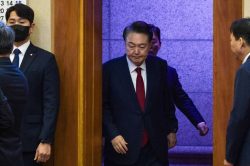
An aerial view of former U.S. President Donald Trump’s Mar-a-Lago home after Trump said that FBI agents raided it, in Palm Beach, Florida, U.S. August 15, 2022. REUTERS
12:05 JST, August 24, 2022
The communication, which has been reviewed by The Washington Post, was a crucial pivot point in the probe of Trump’s handling of classified documents that led to the dramatic search of his Mar-a-Lago Club earlier this month.
Within weeks, Trump would have new lawyers to deal with the documents, and the FBI’s attention would shift from top-secret material Trump returned to the Archives to classified items they believed he had kept in Florida. One lawyer who received the email, former White House deputy counsel Pat Philbin, would be interviewed by FBI agents who considered him a witness in the rapidly expanding investigation.
Some of Trump’s allies have blamed the rushed and haphazard packing process during Trump’s final days in office for the presence of documents the FBI found in Trump’s bedroom, office and a first-floor storage room at Mar-a-Lago on Aug. 8. But the key events that led to the FBI search took place only this year, after months of slow-rolling conflict between the former president and law enforcement agencies.
Some material recovered in the search is considered extraordinarily sensitive, two people familiar with the search said, because it could reveal carefully guarded secrets about U.S. intelligence-gathering methods. One of them said the information is “among the most sensitive secrets we hold.”
This account of Trump’s effort to keep the FBI from reviewing the classified material is drawn from newly released correspondence and court filings, as well the recollections of multiple people with direct knowledge of the investigation or who were briefed on events. Many of them spoke on the condition of anonymity due to the ongoing criminal probe.
In a legal filing on Monday, Trump’s lawyers insisted that he had been cooperating with Justice Department requests. In fact, however, the narrative they laid out, as well as other documents and interviews, show that Trump ignored multiple opportunities to quietly resolve the FBI concerns by handing over all classified material in his possession – including a grand jury subpoena that Trump’s team accepted May 11. Again and again, he reacted with a familiar mix of obstinance and outrage, causing some in his orbit to fear he was essentially daring the FBI to come after him.
In a May 10 letter to Trump lawyer Evan Corcoran that was released Tuesday, acting archivist Debra Steidel Wall outlined weeks of resistance that followed the April 12 email. Trump tried to delay and thwart the FBI’s review of the records he had turned over to the Archives in January, Steidel Wall wrote, despite a finding by the Justice Department that the records included 100 classified documents comprising 700 pages of material, some of it extraordinarily sensitive information related to secret operations and programs with very limited access, on a need-to-know basis.
“It has now been four weeks since we first informed you of our intent to provide the FBI access to the boxes so that it and others in the Intelligence Community can conduct their reviews,” Steidel Wall wrote, adding that Trump’s lawyers had asked for more time to determine if the records included documents they considered protected by executive privilege.
The May 10 letter said government lawyers had concluded that executive privilege is held by the current president, not a former one, and that President Joe Biden had delegated to Steidel Wall the decision as to whether the FBI should be allowed to view the records. “I have therefore decided not to honor the former President’s ‘protective’ claim of privilege,” she wrote, indicating she would allow the FBI to begin viewing the records in two days. Before it was released publicly, the letter was published by John Solomon, a Trump ally who runs a news website.
In Trump’s inner circle, concern has been rising since June that the former president has created legal jeopardy for himself, according to multiple people in his orbit. “Mar-a-Lago is a big problem,” one of the people said.
Trump spokesman Taylor Budowich did not respond to specific questions for this article. In an email, he said Trump “will defeat this massive abuse of government just like every one before by exposing the lies and championing the truth.”
***
Under the Presidential Records Act, a 1970s-era statute passed in the wake of the abuses of Richard Nixon’s White House, documents prepared for the president are considered public property, overseen by the National Archives after a president leaves office.
After Trump’s term ended in January 2021, Archives officials identified various high-profile items that had not been sent to their collection and requested they be located and turned over. What followed was a tortured standoff among Trump; some of his own advisers, who urged the return of documents; and the bureaucrats charged by the law with maintaining and protecting presidential records. Trump only agreed to return some of the documents after a National Archives official asked a Trump adviser for help, saying they may have to soon refer the matter to Congress or the Justice Department.
Nearly a year later, on Jan. 17, 2022, Trump returned 15 boxes of newspaper clips, presidential briefing papers, handwritten notes and assorted mementos to the National Archives. That was supposed to settle the issue.
Instead, when Archives employees began opening up and sifting through the material, they noticed an immediate problem. The boxes arrived without any kind of logs or inventories to describe their content, according to person familiar with the recovery. Instead, they contained a hodgepodge of documents, including some that didn’t even come from Trump’s time in the White House.
But some of the White House records had obvious markings indicating they were classified.
By early February, the Archives had referred the matter to the FBI. Congressional Democrats also learned of the issue and vowed to investigate. People close to Trump say he was livid, particularly at pledges from House Oversight and Reform Committee Chairwoman Carolyn B. Maloney, D-N.Y., to probe the issue.
It could not be determined who was involved with packing the boxes at Mar-a-Lago or why some White House documents were not sent to the Archives, though people familiar with the episode said Trump oversaw the process himself – and did so with great secrecy, declining to show some items even to top aides. Philbin and another adviser who was contacted by the Archives in April have told others that they had not been involved with the process and were surprised by the discovery of classified records.
As it began its investigation in February and March, the FBI interviewed several Archives officials about the returned classified documents and their interactions with Trump’s team, people familiar with the investigation said.
By April, the FBI was ready to come look at the documents. Under the terms of the Presidential Records Act, the formal request for such a review had to come from the current president – meaning officials in Biden’s White House. And Trump was required to be allowed to review the same documents.
On April 12, an Archives official emailed Philbin and John Eisenberg, another former deputy White House counsel, to tell them the Justice Department, via the Biden White House, had made the request. The email offered the lawyers the opportunity to view the documents as well, but said the documents were too sensitive to be removed from the agency’s secure facility.
A Trump official with proper national security clearance would have to travel to the Archives facility in Maryland to read them.
Both Philbin and Eisenberg had the clearances that would allow them to make the trip. Trump allies tried to get Philbin, and then Eisenberg, to agree to do so, a person familiar with the record dispute said. But neither man had been involved with the original packing of the documents. Nor did they know what had gone into the boxes. Eager not to become more involved in the investigation, they begged off, this person said. The FBI sought to interview Philbin about Trump’s handling of classified material, making him a potential witness in the probe.
Both Philbin and Eisenberg declined to comment on Tuesday.
Once their involvement ended, Archives officials appear to have begun corresponding with Corcoran, a former assistant U.S. attorney who was representing former Trump adviser Steve Bannon in a separate criminal case. Corcoran agreed to join Trump’s team in April. According to Steidel Wall’s letter, he sent a series of requests to the Archives this spring asking the agency to delay giving the FBI access.
Corcoran did not respond to requests for comment. One person with direct knowledge of his interaction with Trump said the former president offered Corcoran the job without ever meeting him, after being introduced by another Trump adviser during a conference call with lawyers and aides.
“There was no vetting done by the president,” the person said of Corcoran, adding that other lawyers had declined the job already. “The president got on the call, asked him his name, and if he wanted to do this work, and he said yes.”
By May 10, Trump’s team still had not reviewed the documents, and Steidel Wall was ready to move ahead, telling Trump’s representatives that the government had given them nearly a month. She said Biden had left up to her the decision of whether executive privilege should apply.
“The question in this case is not a close one,” Steidel Wall wrote. “The Executive Branch here is seeking access to records belonging to, and in the custody of, the Federal Government itself, not only in order to investigate whether those records were handled in an unlawful manner but also, as the National Security Division explained, to ‘conduct an assessment of the potential damage resulting from the apparent manner in which these materials were stored and transported and take any necessary remedial steps.’ “
As the fight with the Archives came to an uneasy conclusion, the FBI proceeded with interviews with others in Trump’s orbit, including valets and former White House staffers, people familiar with the interviews said.
Agents were told that Trump was a pack rat who had been personally overseeing his collection of White House records since even before leaving Washington and had been reluctant to return anything. The FBI became increasingly convinced that the former president continued to hold classified documents in Florida, people familiar with the investigation said.
A day after Steidel Wall’s letter to Corcoran, Trump’s lawyer accepted a grand jury subpoena seeking any records with classified markings at Mar-a-Lago.
Lawyers for Trump described the subpoena in their court filing on Monday, which claimed the FBI search was overbroad and unfair. They wrote that in response to the subpoena, Trump directed that “a search for documents bearing classification markings should be conducted – even if the marked documents had been declassified.”
Trump’s lawyers do not appear to have argued to Steidel Wall that Trump had declassified the documents that bore classified markings before he left office. While presidents have widespread authority to declassify documents, there is a process for doing so, and even declassified documents are required by the Presidential Records Act to remain in Archives custody.
Christina Bobb, a lawyer for Trump, has said that Corcoran led the review of documents held at Mar-a-Lago after Trump’s team received the May 14 subpoena.
On June 3, Bobb and Corcoran met with a senior Justice Department official and three FBI agents, turning over the records they had gathered. “We turned over everything that we found,” Bobb told Fox News host Laura Ingraham earlier this month.
Around that time, Corcoran and Bobb together provided the Justice Department with a written assurance about Trump having returned classified materials, a person familiar with the matter said. The person did not provide the specific wording of the letter, which was signed by Bobb, as first reported by the New York Times.
A person familiar with the matter said the document is of interest to the FBI, which is investigating the veracity of its claims.
Trump’s lawyers said in their court filing that following the June 3 meeting, the FBI conducted another round of interviews with personal and household staff to Trump.
On June 22, the Justice Department handed a new subpoena to the Trump Organization, which owns Mar-a-Lago. The subpoena sought surveillance video to help show who might have been coming and going from the storage area where Corcoran and Bobb had indicated boxes of records taken from the White House were being stored.
The footage showed various people entering and leaving the room, according to a person with direct knowledge of it.
Just under seven weeks later, the FBI moved in.
Top Articles in News Services
-

Survey Shows False Election Info Perceived as True
-

Prudential Life Expected to Face Inspection over Fraud
-

Hong Kong Ex-Publisher Jimmy Lai’s Sentence Raises International Outcry as China Defends It
-

Japan’s Nikkei Stock Average Touches 58,000 as Yen, Jgbs Rally on Election Fallout (UPDATE 1)
-

Trump Names Former Federal Reserve Governor Warsh as the Next Fed Chair, Replacing Powell
JN ACCESS RANKING
-

Japan PM Takaichi’s Cabinet Resigns en Masse
-

Japan Institute to Use Domestic Commercial Optical Lattice Clock to Set Japan Standard Time
-

Israeli Ambassador to Japan Speaks about Japan’s Role in the Reconstruction of Gaza
-

Man Infected with Measles Reportedly Dined at Restaurant in Tokyo Station
-

Videos Plagiarized, Reposted with False Subtitles Claiming ‘Ryukyu Belongs to China’; Anti-China False Information Also Posted in Japan
























